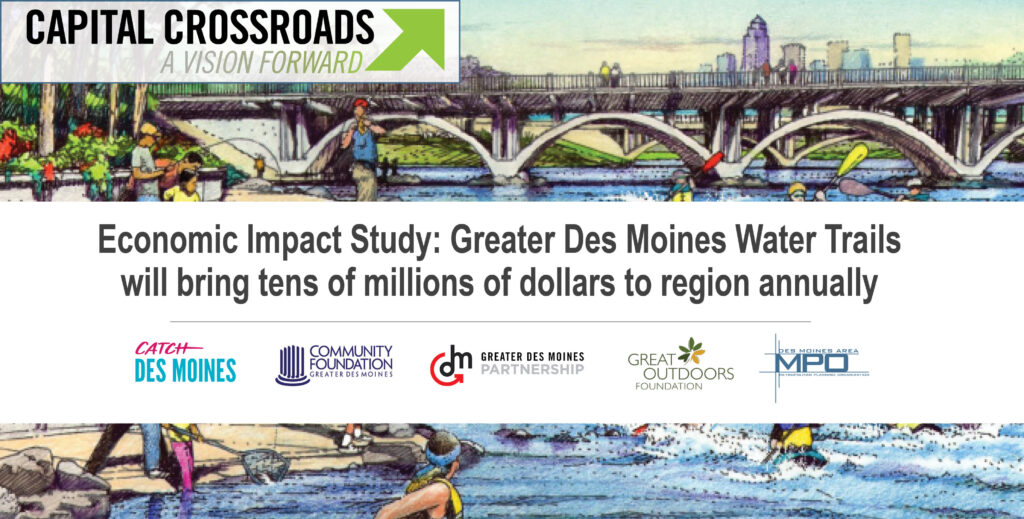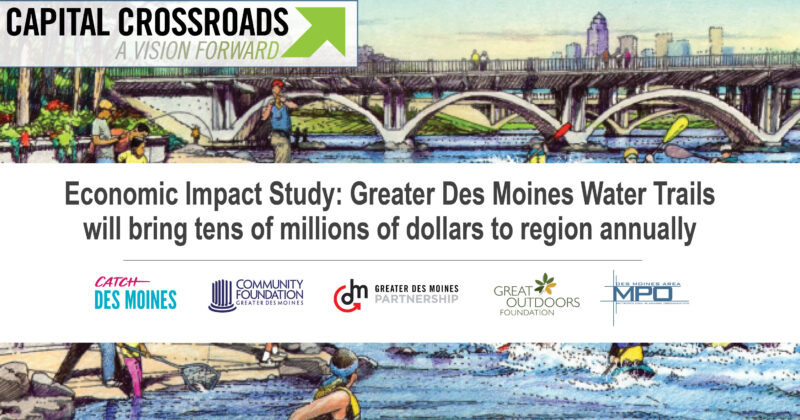
Greater Des Moines Water Trails will annually pour tens of millions of dollars into the regional economy, a new analysis shows.
Among the findings of the Greater Des Moines Water Trails Economic Impact Study: Within the first five years of opening, the planned Adventure Park and whitewater venues in Downtown Des Moines are conservatively projected to generate $104.4 million in direct spending across the region, which includes lodging, food and beverage, retail purchases, transportation, sightseeing and entertainment. The downtown projects will require an approximately $106 million investment up-front to build the infrastructure. By the fifth year of operation, direct spending into the economy is projected at $26 million to $32 million annually.
“We knew water trails would boost tourism and economic development, and the economic analysis confirms it,” said Greg Edwards, CEO of Catch Des Moines. “This study gives us confidence that water trails will be a major contributor to the regional economy.”
The Greater Des Moines Water Trails Economic Impact Study was commissioned by Capital Crossroads on behalf of implementation partners Catch Des Moines, Community Foundation of Greater Des Moines, Greater Des Moines Partnership, Great Outdoors Foundation, and Des Moines Area Metropolitan Planning Organization. The Economic Impact Study encompasses the projects in Downtown specifically. A summary is included below, including information on jobs and tax revenues related to the project.
“The addition of an adventure park and whitewater features in Downtown Des Moines will contribute to the efforts happening throughout the region, and its impact will be felt region-wide,” said Kristi Knous, President of the Community Foundation of Greater Des Moines and a Tri-Chair of Capital Crossroads. “This economic impact study shows significant momentum toward fulfilling the regional water trails vision.”
A funding feasibility study is underway for the Greater Des Moines Water Trails, which will enhance people’s experience in and along 150 miles of waterways throughout the region. For more information on the Downtown project and projects throughout the region, please visit dmampo.org/water-trails-engineering-study/.
MEMO: Key takeaways from the Greater Des Moines Water Trails Economic Impact Study, conducted by Johnson Consulting.M
A Funding Feasibility Study is underway for the Greater Des Moines Water Trails. An Economic Impact Study was completed to answer key questions for stakeholders, especially funders in the public and private sectors, as it relates to the Adventure Park and whitewater venue in downtown Des Moines. The following memo summarizes the key takeaways.
SCOPE: The study provides information on the three downtown dam projects, not the broader network of regional water trails projects. The study takes the usage projections of the Water Trails Business Plan and applies an economic multiplier that is specific to Polk County. The multiplier was provided by IMPLAN, a nationally respected economic data firm.
PASS-THROUGH TO LOCAL ECONOMY: The investment in the three downtown dam-mitigation projects passes through to the regional economy. The downtown whitewater venue will cost approximately $106 million to build. Within the first five years of opening, it is conservatively projected to generate $104.4 million in direct spending, which includes lodging, food and beverage, retail purchases, transportation, sightseeing and entertainment. Direct spending is projected at $26-32 million annually once the venue matures.
LARGER TOTAL ECONOMIC IMPACT: The total economic impact is larger if “indirect” and “induced” spending are included. “Indirect spending” consists of re-spending of the initial economic impact, such as restaurants purchasing additional food due to increased sales. “Induced spending” represents changes in local consuption due to the personal spending by employees whose incomes are affected by direct spending. The total economic impact – including direct, indirect, and induced – reaches $173.8 million in the first five years of opening.
JOBS: Employment in multiple sectors will increase by a projected 151 full-time equivalent positions in Year 1, earning $8.3 million in wages. Employment is projected to grow to 202 full-time equivalent jobs by Year 5, earning $12.6 million.
TAX REVENUE: $7.3 million in tax revenue will be generated in the first five years of operation, reaching more than $1.7 million annually by Year 5. Tax revenues include sales tax, hotel/motel tax, and excise tax.
CONSERVATIVE NUMBERS: The Economic Impact Study relies on conservative usage projections provided by Merrick & Company. The actual economic impact could be more significant.

